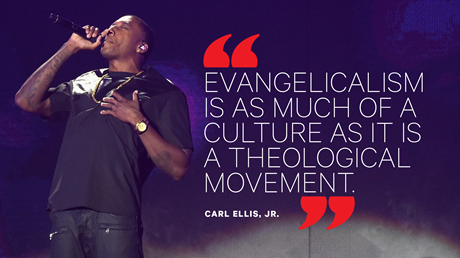Why many align theologically with the movement but feel left out culturally.

Several weeks after Lecrae dropped his latest album, the biggest name in Christian hip-hop joined the podcast Truth’s Table. The topic of conversation: the rapper’s musical and personal transformation since his last album, a three-year period during which Lecrae become increasingly vocal in speaking up about racial injustice. (Listen here.)
In response to a question about whether he “divorced white evangelicalism,” he said:
I spoke out very frequently throughout 2016 in many different ways and it affected me. I went from a show that may have had 3,000 there to 300 but that was the cost. But those 300 people were people who I knew loved Lecrae, the black man, the Christian, all of who Lecrae was, not the caricature that had been drawn up for them.
Lecrae’s decision to distance himself from evangelicalism is personally familiar to Carl Ellis Jr., a senior fellow at the African American Leadership Institute and a professor at Reformed Theological Seminary, who doesn’t consider himself reflected in the movement.
“I cannot identify with much of what evangelicalism identifies with,” Ellis said. “Yes I believe Scripture to be the inerrant, inspired, infallible Word of God and all of that, but on the other hand, there’s so much baggage that goes along with it.”
Like Lecrae, another obstacle for Ellis in connecting with the movement was its lack of emphasis on justice issues.
“I was very active in the civil rights movement,” said Ellis, who marched with Martin Luther King Jr. “But when I got saved, I somehow got the subliminal message that I had to leave all of that behind. I think Lecrae was picking up on the fact that there’s something wrong here.” …
Source: Christianity Today Most Read